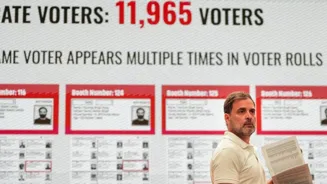Responding to Lok Sabha Opposition Leader Rahul Gandhi’s accusations of ‘vote chori’ in recent polls, the Election Commission has challenged him to file an oath on false electors in the voter list. Why
is Gandhi being asked to file an oath? Can an oath land the Congress leader in legal trouble?
Rahul Gandhi’s allegations
The Congress leader, at a press meet in Karnataka on Thursday, alleged irregularities in the electoral rolls of the recently held polls, saying the poll body was working in collusion with the ruling Bharatiya Janata Party to destroy the election system in India.
Gandhi said that while the Congress won six out of seven segments in the Bangalore Central Lok Sabha constituency, it lost in the Mahadevapura Assembly segment in which it was defeated by over 1,14,000 votes. The Congress leader alleged ‘vote chori’ of 1,00,250 votes in the constituency with 11,965 duplicate voters in one assembly segment, 40,009 voters with fake and invalid addresses, 10,452 bulk voters or single address voters, 4,132 voters with invalid photos and 33,692 voters misusing Form 6 of new voters.
He alleged a woman, Shagun Rani, has two voter ID cards. It also has a tick mark (✓) from the officer at the polling station, which proves that Shagun Rani has voted twice, he alleged.
The EC’s response
The chief electoral officer for Karnataka refuted the claims, asking the Opposition leader to file it with details of electors included or excluded in the list. The poll body denied that Shagun Rani had voted twice.
“It is understood that during a press conference held today, you had mentioned about the inclusion of ineligible electors and exclusion of eligible electors in the Electoral Rolls. You are kindly requested to sign and return the enclosed Declaration/Oath under Rule 20(3)(b) of the Registration of Electors Rules, 1960, along with the name(s) of such elector(s) so that necessary proceedings can be initiated,” it said.
Notice to Shri Rahul Gandhi, Hon’ble Member of Parliament and LoP, Lok Sabha.@ECISVEEP pic.twitter.com/plSfgoeytZ
— Chief Electoral Officer, Karnataka (@ceo_karnataka) August 10, 2025
How has the Congress responded?
Congress General Secretary KC Venugopal has said that the allegations are based on the Commission’s own data, i.e. the electoral roll. “Now you are asking for documentsfrom them after catching them red-handed? This is the same data that you have,” he said.
Gandhi alleged that the EC is refusing to provide digital, machine-readable voter lists. He says that the evidence is available in public. Yet the Commission is questioning the “whistleblower”.
वोट चोरी ‘एक व्यक्ति, एक वोट’ के बुनियादी लोकतांत्रिक सिद्धांत पर हमला है।
स्वतंत्र और निष्पक्ष चुनावों के लिए साफ़-सुथरी मतदाता सूची अनिवार्य है।
चुनाव आयोग से हमारी मांग साफ़ है – पारदर्शिता दिखाएं और डिजिटल मतदाता सूची सार्वजनिक करें, ताकि जनता और राजनीतिक दल उसका खुद ऑडिट… pic.twitter.com/BIahCz2YBb
— Rahul Gandhi (@RahulGandhi) August 10, 2025
What is the oath?
Rahul Gandhi has been asked to sign an under Rule 20 of the Registration of Electors Rules, 1960, regarding inclusion and exclusion of names from the list.
Gandhi has been asked to declare, “I am not/ I am an elector of the said constituency, I have personal knowledge relevant to this case and am making this statement voluntarily.”
Vote Chori सिर्फ़ एक चुनावी घोटाला नहीं, ये संविधान और लोकतंत्र के साथ किया गया बड़ा धोखा है।
देश के गुनहगार सुन लें – वक़्त बदलेगा, सज़ा ज़रूर मिलेगी। pic.twitter.com/tR7wh589fN
— Rahul Gandhi (@RahulGandhi) August 8, 2025
Can the oath lead to punishment or jail term? What the law says
Making a false declaration in connection with the electoral rolls is punishable under Section 31 of the RP Act, 1950. Giving false evidence is punishable under Section 337 of the Bhartiya Nyaya Samhita, 2023 (which replaces Section 466 of the Indian Penal Code).
RP Act: One-year jail term
As per Section 31 of the Representation of People Act, 1950, ii any person makes in connection with—
(a) the preparation, revision or correction of an electoral roll, or
(b) the inclusion or exclusion of any entry in or from an electoral roll,
a statement or declaration in writing which is false and which he either knows or believes to be false or does not believe to be true, he shall be punishable with imprisonment for a term which may extend to one year, or with fine, or with both.
चुनाव आयोग, 5 सवाल हैं – देश जवाब चाहता है:
1. विपक्ष को डिजिटल वोटर लिस्ट क्यों नहीं मिल रही? क्या छिपा रहे हो?
2. CCTV और वीडियो सबूत मिटाए जा रहे हैं – क्यों? किसके कहने पर?
3. फर्जी वोटिंग और वोटर लिस्ट में गड़बड़ी की गई – क्यों?
4. विपक्षी नेताओं को धमकाना, डराना – क्यों?… pic.twitter.com/P0Wf4nh5hc— Rahul Gandhi (@RahulGandhi) August 8, 2025
Section 337 of BNS: 7-year jail term
This section penalises anyone who forges a document or electronic record purporting to be:
- A record or proceeding of a Court,
- A government-issued identity document (e.g., voter ID, Aadhaar card),
- A register of birth, marriage, burial, or data maintained by a public servant,
- A certificate or document made by a public servant in official capacity,
- An authority to institute/defend a suit, confess judgment, or a power of attorney.
Such an offence is punishable with imprisonment up to 7 years and a fine. According to legal experts, this can be a non-bailable offence.
❌ The statements made are False & Misleading.
दिए गए बयान झूठे और भ्रामक हैं। #ECIFactCheck
✅Read in detail in the image attached 👇
संलग्न चित्र में विस्तार से पढ़ें👇 pic.twitter.com/FFBi98NJMb
— Election Commission of India (@ECISVEEP) August 10, 2025
Cancellation of membership of Parliament: Consequences on political career
The term and consequences of the sentence, if the charges are proven, can also affect the political career of the convicted person.
According to the Representation of the People Act, 1951, a sentence of 2 years or more can result in the cancellation of membership of Parliament or the Legislative Assembly.













